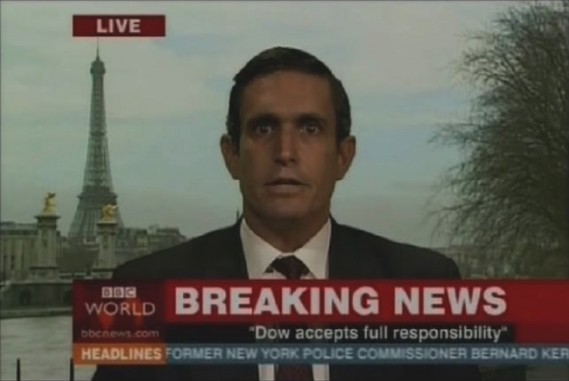It's All Downhill: Riding the Film-Finance Roller Coaster
On the cusp of the debut of their new film, The Yes Men (2000 Emerging Fields) have written a blog post for us detailing the various ways they have funded their feature-length projects over the past decade. From working with HBO to desperately touring Sundance to using crowd funding platforms, it hasn’t always been easy, they tell us.
We are currently preparing for a June 12 release of The Yes Men are Revolting, the third movie in a series that began fifteen years ago with a Creative Capital grant. As we gear up for the release, one of the most common questions we’re asked is how we support our work. Sadly, the answer today is more difficult and complex than ever.
In 2000, we were in the first round of awards from the fledgling Creative Capital. In hindsight, we really had no clue how lucky we were. We leveraged that grant to get a few more (NYFA Fellowships, a Herb Alpert Award, a couple of Guggenheim and Langlois grants). That covered the cost of launching a barrage of creative actions aimed at the World Trade Organization, which became the backbone of our first film, The Yes Men. The grants covered these actions, and the filmmaking costs were covered by Chris Smith, the Sundance prize-winning director who directed that movie, using his earnings from commercial work to finance it all.
Four years in the making, the film went to market in 2003, where it rode the wake of the blockbuster Bowling for Columbine. Our doc, like Michael Moore’s, was funny and political, so major players wanted a piece of it, hoping to cash in. After a minor bidding war, United Artists picked up our film in North America, and gave us a healthy advance; we had good deals in the rest of the world too.

In an interview with the BBC, Andy Bichlbaum of The Yes Men impersonated a Dow Chemical exec accepting full responsibility for the 1984 toxic gas disaster in Bhopal, India
In addition to the money, with these sales came what we now recognize in hindsight as a big luxury. Since the distributors were doing what was needed to get the film out there, all we had to do was show up for press and a few screenings; we could concentrate on being ourselves. We did better than break even, and the film business seemed like a good way to keep our creativity flowing.
Little did we know that the market had something different in mind. We launched into our second film, The Yes Men Fix The World, just as traditional film distribution began to fall apart. People had new ways to watch films (like file-sharing) and, also, to not watch them (like choosing video games instead). “Market forces,” amplified by advocates of “self-distribution,” seemed to be telling us we would need to work a lot harder on promotion and distribution, and to spend less and less time on anything we’d call creative.
But we had one big success under our belt, so we thought we’d do this film the right way regardless: by raising the budget from broadcasters in advance. The Channel 4 Britdoc Foundation came in with a decent amount of money to get us going. But when we scored a coveted contract with TV broadcaster Arte in France, the dream turned into a nightmare when they held the money without releasing it to us—meaning we started to spend our own savings to keep the production from grinding to a halt. Luckily, some American producers came on board with an angel investor, and we made up the remaining gap by begging our mailing list for help. Dozens of people, many of whom we’d never met (and a number of whom we later discovered to be living in poverty!) loaned us money.
By the time we finished The Yes Men Fix the World, we were hugely in debt. We went to Sundance with a sense of desperation. If we didn’t make a sale, we were sunk. And the film market, which relies so heavily on the spoils of bull markets, was at rock bottom in the wake of the 2007 financial crisis.
We didn’t make a sale at Sundance. Fortunately, a few weeks later HBO bought the film and bailed us out. But there was a hitch: they needed a television premiere, which meant that no film distributor would touch it afterwards. None but us, that is: we would do it ourselves. With the guidance of indie film guru Peter Broderick, and the boutique distributor Shadow handling theatrical, we began personally rolling out our second film.
This experience was way different than the release of our first film, where the distributor did most of the work. Now it was all on us, and that took its toll. The stress, pressure and long hours—coming after the stress, pressure and long hours of actually making the film—led some of our team to what can only be called burnout.
The film itself was a success: we even had the distinction of being number one on the torrent charts for a week, beating out the big studio films. Great for our reputation, but poor for our revenues, and, for some of us for a while, very poor for our happiness and productivity.
VIDEO: Official trailer for The Yes Men Are Revolting
Fast-forward to today. We’re on the cusp of another release. This one is called The Yes Men are Revolting. In our experience, it’s become harder than ever to finance a film. In addition to dwindling television budgets, now we are not only expected to work on distribution when the film is finished, but also before we start making it: we mean that demonic thing called crowdfunding.
Crowdfunding is considered a blessing, because it enables you to raise money when all other revenue streams are dry. But it’s also a curse: instead of making the film, we find ourselves making Kickstarter videos and running campaigns, sometimes before we even know exactly what the film’s going to be.
When we’re doing all that, of course, we’re not making a film. We slowly drain our social capital as we beg our Facebook friends (even the destitute ones) for money. We think up products to give out as rewards. We operate a mail-order store, shipping and making things.
All that is just fine if your intent all along is to sell some product or other: it’s probably no accident that the top-funded projects on Kickstarter are smart watches, fancy beer coolers, and the like. But if you’re trying to make a difference in the world, be it in the realm of poetry or advocacy, the need to crowdfund is a major curse indeed. It can even force a kind of self-censorship, as you try to tailor your work to raise money, instead of what it should do.
Worst of all, because it seems from the outside to work, crowdfunding allows us to accept a situation in which public grants are non-existent. Why mourn the loss of the NEA and the like? The real answer is: because artists and activists must now spend the bulk of their time cajoling a crowd, rather than challenging them.
The lack of public funding affects us directly, and also through our distributors: without any public support, the margins for these companies are so small that we need to share the burden if we want to make our films fly. We’re lucky to have a distributor on board, but it’s way harder than it was when we started. Unless we want all films to be aimed at the lowest common denominator, we’d better wake up, and soon.
Meanwhile, we look back at our 2000 Creative Capital grant with more than just nostalgia. It truly allowed our creativity to flourish, just as it continues to nourish so many more up-and-coming artists and activists today. Until there’s a change in the way we as a society deal with challenging work, Creative Capital is truly the best thing we’ve got.
The Yes Men Are Revolting will premiere on iTunes, VOD and Vimeo June 9th and in theaters June 12th. Join the revolt on Twitter by following @TheYesMen.

